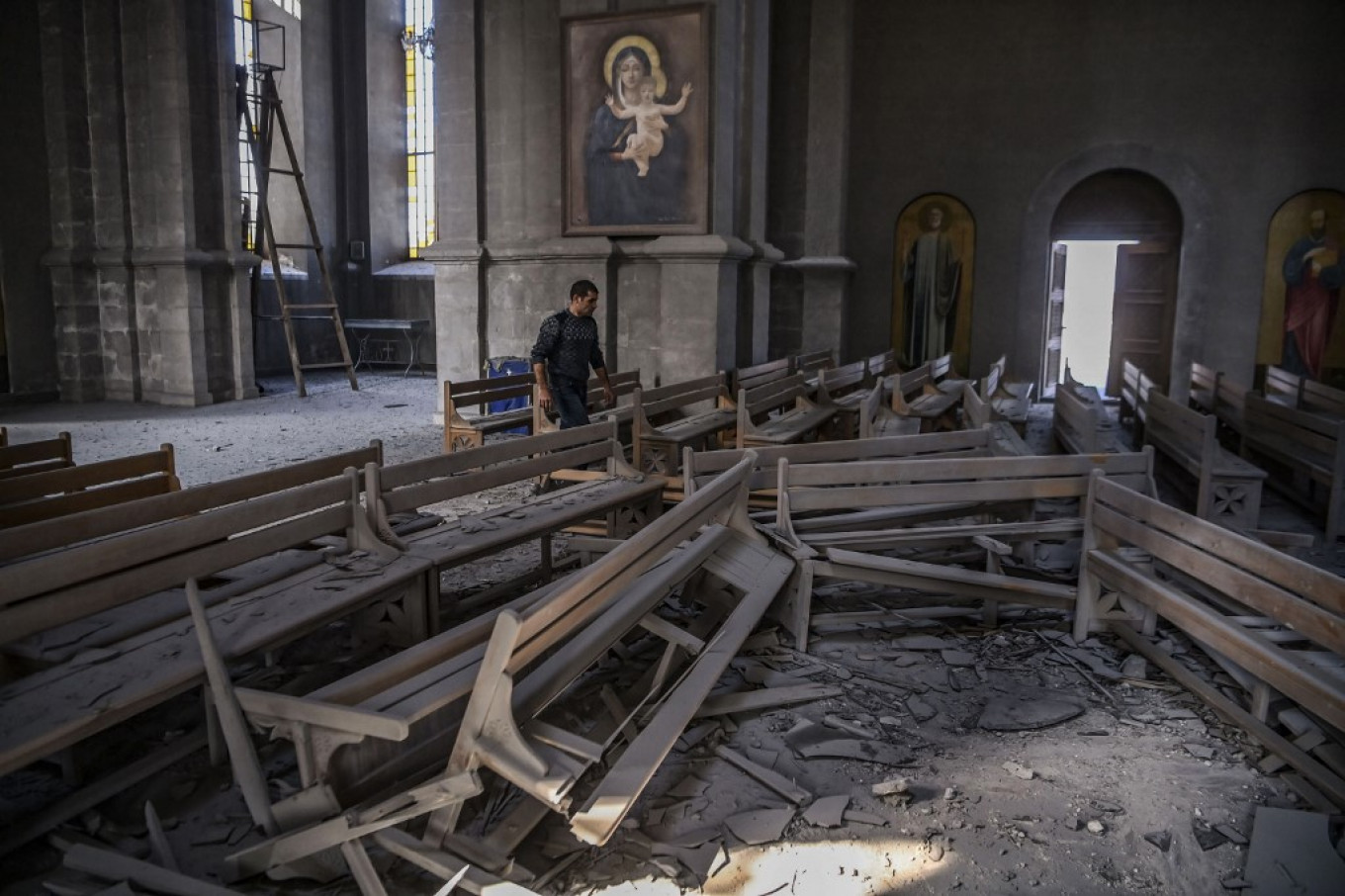
Armenia accused Azerbaijan on Thursday of shelling a historic cathedral in Nagorno-Karabakh ahead of the first meeting of international mediators seeking to halt escalating fighting over the disputed region.
Expectations for any major breakthrough from the talks in Geneva were low and no statements were expected from the negotiations being held behind closed doors and without Armenian participation.
Azerbaijan and Armenia have for two weeks been locked in bitter fighting over Nagorno-Karabakh, an Azerbaijani region controlled by Armenians who declared an unrecognized breakaway state and emerged victorious from a war in the wake of the fall of the U.S.S.R.
The current fighting, which has left hundreds dead including civilians, is the worst since a 1994 ceasefire with both sides doubling down on entrenched positions over who should control the region.
Defense officials in Azerbaijan and Armenia said fighting continued into Thursday, with both sides claiming to have inflicted heavy losses and accusing the other of shelling civilian areas.
There was a gaping hole in the roof of the Ghazanchetsots (Holy Savior) Cathedral, AFP journalists reported, after Armenia’s defense ministry accused Azerbaijan of targeting a cherished site for the Armenian Apostolic Church.
Baku denied its forces were behind the attack, saying that unlike Armenia, “the Azerbaijani army does not target historical, cultural, or especially religious, buildings and monuments.”
Rubble was strewn about the floor, pews were knocked over and the interior was covered in dust from parts of the building’s limestone walls that had been hit. A section of its metallic roof had collapsed and fallen to the ground outside.
“There is no military, nothing strategic here, how can you target a church?” local resident Simeon, who lives near the church, said.
Thousands forced to flee
Azerbaijan’s Foreign Minister Jeyhun Bayramov was to meet diplomats from France, Russia and the United States, who make up the “Minsk Group” that has sought a solution to the Karabakh conflict since the 1990s.
Armenia’s foreign minister will not be attending, after Yerevan ruled out talks between the two countries’ top diplomats as long as clashes are ongoing. Zohrab Mnatsakanyan will instead meet his Russian counterpart in Moscow on Monday.
Explosions and sirens sounded in Nagorno-Karabakh’s regional capital Stepanakert as the city continued to face regular shelling early Thursday, AFP journalists said.
Heavy bombardments have levelled many homes since fighting erupted late last month and Stepanakert is pockmarked with unexploded ordnance and wide craters from shelling.
Alongside the new bombardments in Stepanakert, Azerbaijan said Armenian shelling on several villages near the frontline had left people dead and wounded.
Armenia’s rights ombudsman Artak Beglaryan told AFP on Wednesday that the renewed fighting has displaced around half of Karabakh’s 140,000 residents and forced some 90% of its women and children from their homes.
The fighting in one of the most combustible frozen conflicts resulting from the fall of the Soviet Union erupted on Sept. 27, with Azerbaijan insisting the region must return to its control.
Threat of international conflict
Dozens of civilians have been confirmed killed in the fighting and the Armenian side has acknowledged more than 300 military deaths. Azerbaijan has not admitted to any fatalities among its troops.
Officials in Baku said Wednesday 427 dwellings populated by roughly 1,200 people had been destroyed.
International leaders have called for an immediate halt to the fighting and Russian President Vladimir Putin on Wednesday described the flare-up as a “tragedy,” calling for a ceasefire “as quickly as possible.”
But there are no signs yet of the conflict abating and Turkey’s strong backing for Azerbaijan has sown fears in the West that the conflict could spiral into a full-blown war embroiling Ankara with Moscow, which has a military treaty with Armenia.
French Foreign Minister Jean-Yves Le Drian on Wednesday said that Turkey’s support of Azerbaijan risks fuelling the “internationalization” of the conflict.
Putin and French leader Emmanuel Macron are among world leaders to denounce the reported deployment of pro-Ankara fighters from Syria and Libya to Karabakh. Iran on Wednesday warned of “terrorists” who had joined the conflict from abroad.
Azerbaijan announced Thursday it was recalling its ambassador to Athens following reports that Greek citizens were joining Armenian forces in Karabakh.
